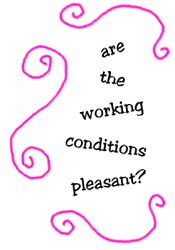 Q Dear Miss Abigail:
Q Dear Miss Abigail:
I would like to become a witch. It seems very stupid and funny, but it is what I would like to learn more about. I fill that I have some potential to make that possible. Please advise me where to start.
Signed,
Yola
A Dear Yola:
Choosing a career is often a difficult decision. In your case, being a witch is really a religious choice and not a career choice, but I think some of the same principles would apply. So before you move to Salem to start a new life, use the following checklist from Everyday Living for Girls to ask yourself some questions about your “career” choice. Is this really what you want to do? Will you make enough money to support you and your coven?
1936: Things To Look For in Your Study of the Vocational Field
![]() In your study of the vocational field answer the following questions, recording your findings in a notebook or file; then compare your findings in several fields and see in which you are most interested:
In your study of the vocational field answer the following questions, recording your findings in a notebook or file; then compare your findings in several fields and see in which you are most interested:
1.What are the duties to be performed in the occupation? Is the work varied or monotonous? Why?
2. Is the activity involved chiefly mental or physical? Are any special mental qualifications required?
3. Does the occupation have to do with people or things? If with people, how will their type affect you?
4. List the various occupations within this field and check the one in which one is usually first employed.
5. What are the education requirements?
6. What are the facilities for obtaining this education: (a) over the country; (b) in your locality?
7. How expensive is it to prepare yourself?
8. What is the chance for advancement, and through what steps is it accomplished?
9. Are there special physical requirements as to age, height, build, color, or others?
10. Will one’s tenure be affected by advancing years, regardless of the quality of one’s work?
11. Are the working conditions pleasant, healthful, and conducive to best effort?
12. Are the hours of work reasonable and regular?
13. Is the work dangerous, and to what extent?
14. Is the work steady or seasonal, and is there much overtime, night work, or rush work?
15. How many persons are engaged in this vocation, and is the occupation overcrowded?
16. What is the beginner’s salary? If the salary of a beginner is low, are there opportunities or advantages which make up for this?
17. In later years will there be time and sufficient income for recreation, enjoyment of home life, and participation in social and civic affairs? If you hope to marry, how will this vocation affect opportunities for social acquaintance?
18. What satisfactions, opportunities, advantages, or reward will you derive other than those of a financial nature?
19. Are workers paid by the piece, hour, or day? Do they receive a commission?
20. What pay does overtime work receive?
21. Does the occupation involve profit sharing?
22. Is a bonus paid?
23. Does the occupation carry sick benefits, workman’s compensation, pension?
24. Is the vocation likely to change on account of new inventions, a change in public taste, or modern trends?
25. Can you change to some kindred occupation if necessary? To what would you turn?
26. What social relation to the community does the work have?
27. How much vacation is allowed? Is it with or without pay?
28. How does one get a job in this field? ![]()
Source: Van Duzer, Adelaide Laura, et. al. Everyday Living for Girls. Chicago: J. B. Lippincott Company,1936.
~ pp. 226-27 ~